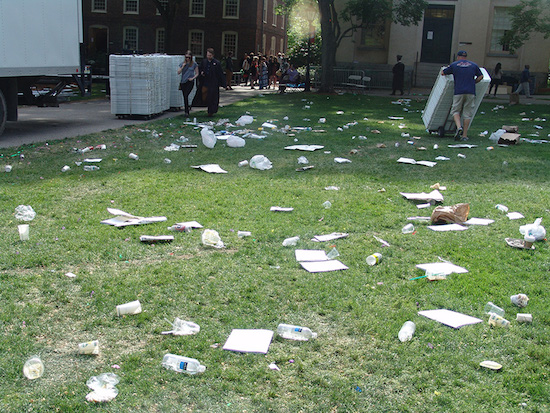Photo and article by FRANK CARINI, ecoRI News
The trashy scene above recently left behind after the Brown University Class of 2015 graduated perfectly exemplified growing U.S. selfishness.
Kindergartners leave a cafeteria with more grace than the elite who exited the Main Green by dumping their lunch trays on the ground. It’s sickening how little we think of others and the places we share that it’s considered acceptable to leave behind an easily-avoidable mess for someone else to clean.
After celebrating the accomplishments of young men and women, the elitists who attended the May 24 graduation left the university lawn littered with half-drunk plastic water bottles, newspapers, commencement programs, half-empty coffee carafes, pieces of lightly bitten fruit and other barely touched foods, and, of course, all things plastic.
The elitists ignored the many bins, barrels and totes that Brown University had thoughtfully placed throughout the area to collect trash and recyclables. Plastic crunched underfoot and litter was inadvertently kicked as graduates and their guests slowly left. The workers responsible for folding the chairs and removing the rest of the commencement infrastructure were left to navigate the debris.
It would be nice to think that the elite kindly left their unwanted food for hungry squirrels, but, sadly, they just thought someone else should pick up their mess. The littering elite couldn’t even be bothered to freshen the trampled lawn with the water they left locked in jettisoned plastic bottles.
There’s little wonder the U.S. recycling rate is a lackluster 35 percent, our composting rate considerably less, consumption is soaring, apathy increasing and our collective concern negligible. Wasted food makes up the largest percentage of all material buried in our landfills. We throw away up to 40 percent of our sustenance, according to the Environmental Protection Agency (EPA).
In fact, the average American wastes 10 times as much food as the average Joe in Southeast Asia — up 50 percent from Americans in the 1970s.
Of the more than 150 million mobile devices we discard annually — many still in fine working order but no longer socially fashionable — only about 12 percent are recycled.
A mobile phone contains about 40 elements, including heavy metals and persistent organic pollutants such as flame-retardants, PVC, lead, cadmium, chromium, mercury, bromine, tin and antimony. Such chemicals have been linked to birth defects, impaired learning, liver toxicity, premature births and early puberty.
Our response to this problem has become the American Way. For instance, the United States is the only industrialized country that hasn’t ratified the Basel Convention, an international treaty that makes it illegal to export toxic e-waste. The convention’s main goal is to protect human health and the environment from hazards posed by trans-boundary movements of hazardous waste.
Since 1990, U.S. greenhouse-gas emissions have increased by about 6 percent, according to the EPA, and we have been one of the largest, if not the largest, emitter of climate-changing emissions for decades. Our response has been to blame China and India for now polluting as much as we do.
Unfortunately, thinking of others and the environment aren’t ideals that get you elected or make you rich and powerful. The trickle-down effect of our expanding self-indulgence was on full display last Sunday at Brown University. The mess is likely unseen in the background of countless selfies.
It has become increasingly OK to leave our trash at college graduations, on airplanes, in movie theaters, at ballparks, in public parks and at the beach. Someone else will pick up mess ... or birds will choke on plastic bottle caps mistaken for food ... or donations will eventually be made to the Great Pacific Garbage Patch.
Since we can’t even be bothered to properly dispose of trash and recyclables at an event that celebrates society’s potential, what sacrifices are we truly willing to make to ensure a prosperous and healthy future for others?
Frank Carini is the editor of ecoRI News.

